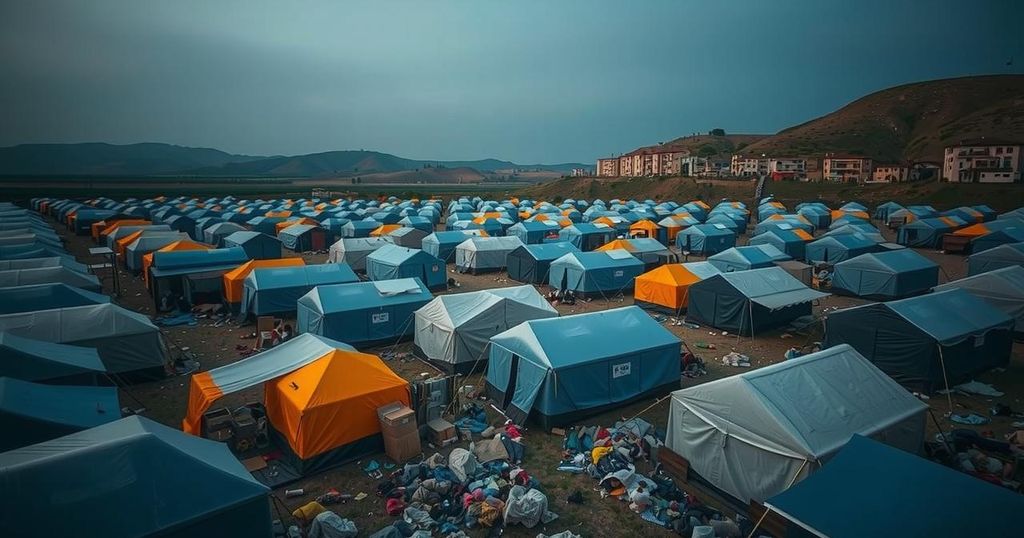Lebanon-Syria Refugee Crisis: A Looming Threat to Regional Stability
The refugee crisis stemming from Lebanon into Syria poses a significant humanitarian and regional stability challenge, with over 276,000 displaced individuals facing dire shortages of resources amidst a backdrop of escalating violence. The capacity of Syria to accommodate these refugees is severely strained due to its prolonged internal conflicts, necessitating urgent international support and intervention to prevent a catastrophic humanitarian escalation and regional destabilization.
The ongoing conflict in Lebanon has triggered a drastic humanitarian crisis, as thousands of Lebanese and Syrians are compelled to flee into Syria amidst escalating violence. An estimated 276,000 individuals, mainly women and children, are now crossing borders under dire circumstances, confronting severe shortages in essential resources such as food, water, and shelter. This mass displacement signifies a complex crisis that is poised to destabilize the broader region, necessitating urgent international attention and action. Angelita Caredda, the Middle East and North Africa regional director for the Norwegian Refugee Council, highlighted the dire implications of this crisis, emphasizing, “We can no longer view the situation in the Middle East as a series of isolated conflicts and displacement crises. Political failure risks destabilizing an entire region and condemning millions to catastrophe. Global diplomacy must move beyond platitudes and unkept commitments.” Syria, already grappling with severe economic challenges stemming from a protracted civil war, is ill-equipped to support the influx of refugees. The existing strain on its economy, coupled with rampant unemployment and poverty, exacerbates the hardships for both the incoming displaced persons and the host community. The infrastructural collapse in key areas such as healthcare, education, and housing further complicates the situation. Even though refugees could potentially invigorate local economies by contributing to the labor force, Syria’s critical shortages in infrastructure and resources hinder any such positive outcomes. The Norwegian Refugee Council’s findings reflect a critical state, with basic resources becoming increasingly scarce and food prices spiking. This crisis is compounded by the fact that Syria has endured significant destruction over more than a decade of conflict, and its capacity to cater to additional refugee populations is severely limited. “Syria is already on its knees after 13 years of conflict. The mass displacement from Lebanon comes at a time when the aid response already cannot keep pace with existing needs,” Caredda remarked, demonstrating the overwhelming pressure now placed on the nation’s fragile support systems. Critically, the most vulnerable among the displaced are children, who face heightened risks of trauma, malnutrition, and lack of protection. Psychological support and essential healthcare services are imperative to safeguard their well-being and assist in their adaptation. Immediate and concerted actions from the international community are crucial to prevent this humanitarian crisis from escalating further. Measures include facilitating diplomatic pathways toward peace, significantly enhancing humanitarian aid, and bolstering Syria’s capacity to accommodate refugees. Although the European Union’s recent commitment of €5 million represents a positive step, substantially more resources are paramount to effectively address this severe and growing crisis. Without concerted intervention, the situation threatens to destabilize the region and deepen the suffering of millions. Therefore, there is an urgent call for global leaders to prioritize more concrete actions over mere rhetoric to address the escalating Lebanon-Syria refugee crisis and mitigate its broader implications for regional stability.
The ongoing crisis between Lebanon and Syria stems from a fierce conflict in Lebanon that has led to widespread violence and displacement. This situation adds complexity to an already critical humanitarian crisis in Syria, which has been suffering from the aftermath of its own prolonged internal conflict. As thousands flee across the border, the lack of resources and infrastructure within Syria presents a daunting challenge to accommodate the newly displaced population, threatening to destabilize the region further amid existing vulnerabilities.
In summary, the exodus of individuals from Lebanon to Syria represents not only a humanitarian emergency but also a significant threat to regional stability. The dire needs of refugees must be addressed through immediate international action, including enhanced humanitarian aid and diplomatic efforts aimed at securing peace. Failure to act could lead to a catastrophic humanitarian fallout with effects reverberating throughout the region. The international community has a responsibility to mitigate this crisis.
Original Source: www.arabnews.com




Post Comment